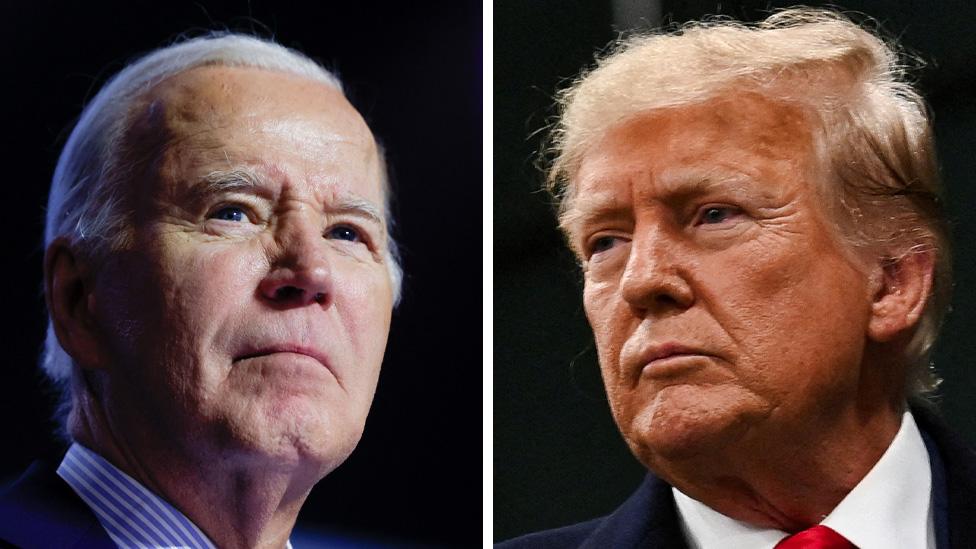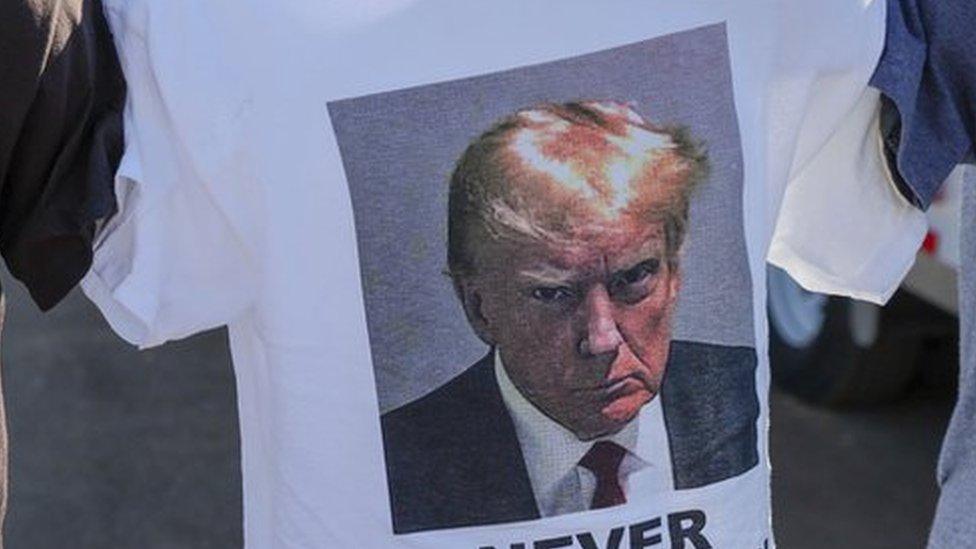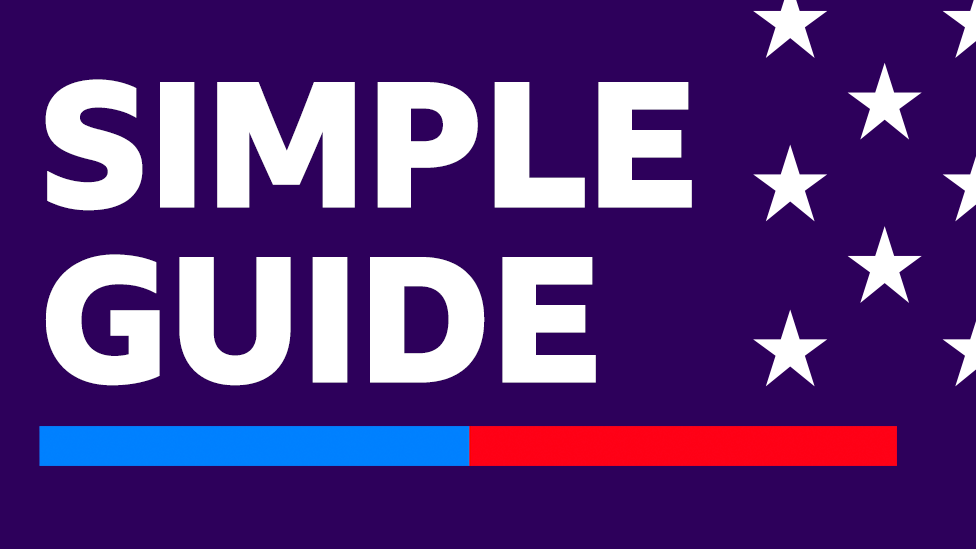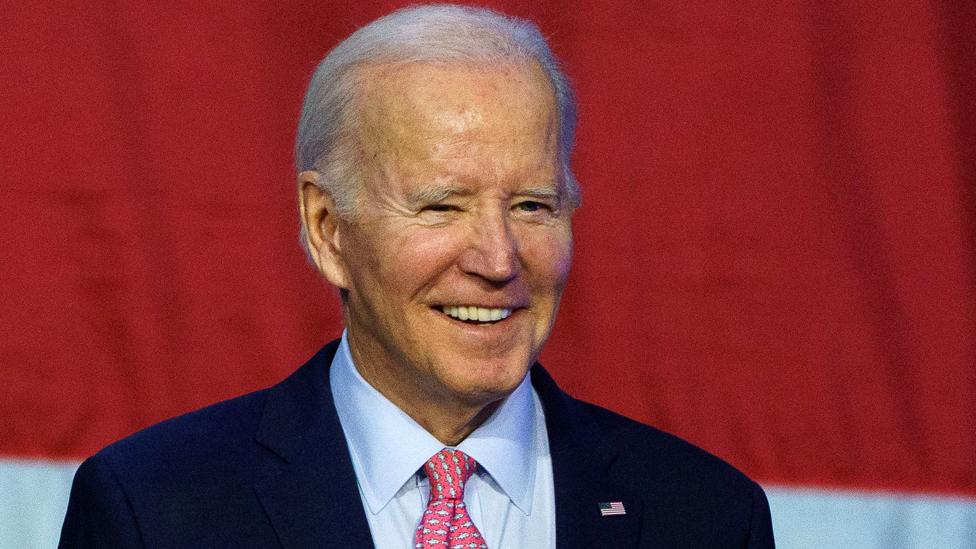Super Tuesday: What is it and why is it important?
- Published
Watch: Why this Super Tuesday isn't as exciting as past ones
Super Tuesday, the biggest day so far in the 2024 race for the White House, is upon us.
On 5 March, voters in 15 states and one US territory choose candidates for president.
While in a sixteenth state, we'll also get the Democrats' results.
It should offer a glimpse of Joe Biden and Donald Trump's strengths and potential weaknesses as the two bitter rivals hurtle towards a rematch in November's general election.
What is Super Tuesday and which states are voting?
It's when most states vote in the presidential primary calendar.
Nominating contests will be held in Alabama, Alaska, Arkansas, California, Colorado, Maine, Massachusetts, Minnesota, North Carolina, Oklahoma, Tennessee, Texas, Utah, Vermont and Virginia.
The Republican contest will be in all of these 15 states, while the Democrats will vote in the same states except Alaska. They will hold caucuses, too, in American Samoa.
We'll also get the results of the Democratic contest in Iowa, which has been ongoing by post for several weeks.
How many delegates are up for grabs?
Based on the result of each contest, party officials known as delegates are awarded to the top candidates. A certain number of delegates is needed to formally anoint the nominee at each party's convention this summer.
About one-third of total delegates - 865 Republican and at least 1,420 Democratic - are up for grabs on Super Tuesday.
The Trump campaign has projected he will win at least 773 delegates on the day and clinch the nomination later in March. He currently has an estimated 244 delegates, while his Republican rival, Nikki Haley, has 43.
A minimum of 1,215 delegates are needed to win the Republican nomination, while 1,968 is the magic number for the Democrats.


More on the US election
Explained: A simple guide to the US 2024 election
Analysis: Where Biden v Trump will be won and lost
Policies: What a Trump second term would look like
Recap: The Trump life story to date

What's at stake for Trump?
With a double-digit lead in the polls, the Republican front-runner will be hoping to finally knock his last remaining rival out of the race.
Former UN envoy Ms Haley is still standing despite only racking up a single win in a string of nominating votes so far and deep-pocketed donors closing their wallets.
Although she has no clear path to victory, Super Tuesday may be her last chance to impede Mr Trump's momentum, or expose his potential vulnerabilities heading into the general election.
In some contests to date, Mr Trump has struggled to win over college-educated suburbanites - a demographic that could ultimately thwart his dream of a White House comeback.
What about Biden?
The Democratic president is all but certain to seal his party's nomination, despite long-shot challenges from congressman Dean Phillips and self-help author Marianne Williamson.
The Biden campaign had a setback in Michigan on 27 February when 13% of voters declared themselves "uncommitted" amid a campaign to register a protest ballot over the president's support for Israel.
Last-minute campaigns are being cobbled together for similar protest votes in other states on Super Tuesday. California, Colorado, North Carolina, Minnesota and Vermont are among the states where such efforts are underway.
More broadly, exit poll data from across the country could reveal whether an enthusiasm gap among key blocs, including younger voters, poses a challenge for his re-election bid.
When will we know the result?
With votes happening in six time zones, the final outcome will not immediately be known.
Results will start trickling in as polls close on the east coast in the early evening.
US networks, including the BBC's US partner CBS News, are expected to begin calling states from around 20:00 ET (01:00 GMT).
Which are the other contests to watch?
Eyes will be on North Carolina, the only general election battleground voting on Tuesday. Mr Trump beat Mr Biden there in 2020 by just over a single percentage point.
Following a Supreme Court ruling, Mr Trump remains on the ballot in Colorado and Maine, despite both states trying to disqualify him on the grounds of allegedly inciting insurrection.
A potential wildcard is that several states are completely open to voters regardless of party registration. One is Virginia, where Republican voters have a relatively moderate reputation.
The Old Dominion state might be Ms Haley's best hope of a consolation on what is projected to be a tough night for her.


If you're in the UK, sign up here.
And if you're anywhere else, sign up here., external

- Published15 April 2024

- Published5 November 2023

- Published7 November 2024

- Published20 November 2023
